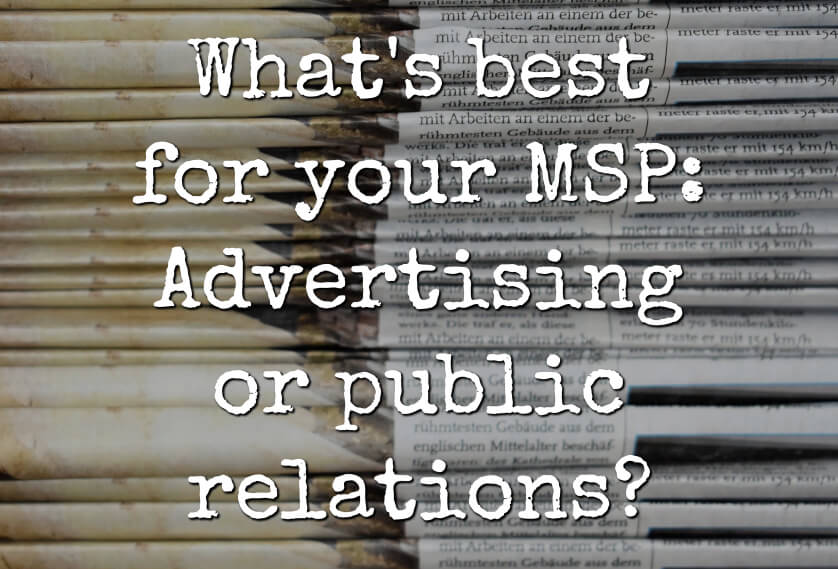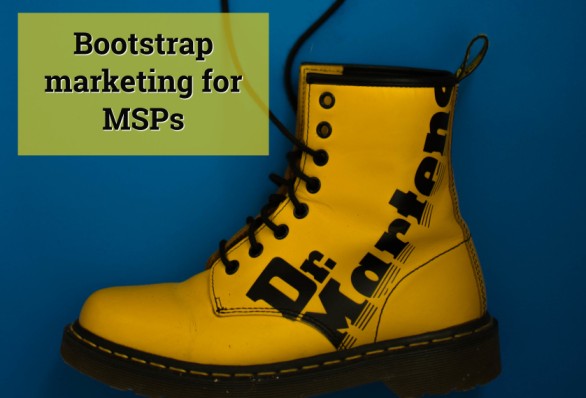This is one of my favourite subjects to talk about. Not only because I started my career as a newspaper reporter and went on to be a radio journalist and presenter (racking up a total of 13 years in the media).
But also because if you get your PR right, you can get journalists in your local media to a) significantly and positively affect your reputation locally, and b) possibly even directly generate leads for you. And best of all, this shouldn’t cost you a penny to do.
Even though local print newspapers are dying off quickly, the hunger for local news still exists. Radio listening is stable, and audiences are these days rapidly moving online to consume their local news.
This actually gives you more opportunities than 10 or 20 years ago. In most news businesses, there are today fewer journalists producing more content to faster deadlines (websites need to be fed content all day, unlike a weekly newspaper with its single weekly deadline).
What this means is that people who give the local media the right kind of stories in the right kind of way are much more likely to get valuable free publicity.
I can’t remember a single story about an IT support company that I gave publicity to when I was a journalist. Here again is something done badly by most MSPs. That means you have every chance to get free publicity, and even enter the journalists’ little black book of contacts… so in time they come to you to help with relevant stories, rather than you having to chase them.
Key message: Sometimes, great success comes from just turning up.
The theory
Let’s start at the beginning. Public relations or PR is any communication between your business and the public.
If you write a letter to apologise to an unhappy client, that's public relations (and these days, that letter could end up on someone’s blog or website).
If your business sponsors a local Scout troop to do a litter pick, that's public relations.
Publicity is one element of public relations, where your communication is done through the media. Note that it’s called free publicity because the media talks about your business for free. If you have to pay in any way, it’s called advertising.
The advantage of advertising is that you have very high control over what is said about your business. After all, you are paying for the space. But that control comes with a high price – very low credibility.
In this media savvy world where we all have commercial messages thrown at us every day, we have learnt to ignore most paid advertisements. We know that when we see an advert, the person has paid to place that message.
Publicity is exactly the opposite. It has very high credibility because it is a journalist saying things about your business, and you can’t pay them to do that. But of course it has very low control. You can influence what a journalist says, but you can’t control it.
You can use free publicity for many things:
- Build brand awareness
- Drive traffic to your website
- Stand out in a crowded marketplace
- Change perceptions about your business
- Educate or influence people (including potential clients)
- Give your business credibility
- Make sure lots of people hear your good stories
- Generate word of mouth publicity
- Deal with a crisis
The 5 unbreakable rules of free publicity
It is simple to get free publicity. In fact, the reason that many businesses get it wrong is because they try to overcomplicate things.
Ever heard of KISS? It stands for Keep It Simple... Stupid. No offence intended. It’s a phrase that almost could have been designed for PR.
There are five powerful and unbreakable rules you should follow when trying to get free publicity:
- Know your target audience and deliver to it:
Journalists are ultra focused on their audience. If the people they are creating content for want to know about a specific subject, that’s what they will write about. If you turn up wanting to get publicity about something else, they won’t be interested. You need to understand exactly what your target audience is interested in, and ensure your story suggestions fit within that. Get that right and it becomes a lot easier to persuade journalists to run your stories.
- Be so different that you naturally catch the attention of journalists:
Any business that enjoys a certain degree of commercial success has differentiated itself from its competitors. And it’s no different when you pursue free publicity. Your story suggestions need to be packed with “standoutability” (a made up word that sums it up perfectly). Journalists get hundreds of press releases and story suggestions every day... if yours are the same as all the others, they’re going to go the same way (the bin).
- Position yourself as an expert
This is the single most powerful idea in publicity. If journalists know you’re an expert in your field, they’ll turn to you first, time and time again, for information and comment on your industry. And that means your clients will know you’re an expert too. Incidentally, it doesn’t really matter who is the one true IT support expert in your area… it matters more who positions themselves first to the journalists and their audience.
- Give journalists what they want and need, when they want and need it
99% of press releases sent to journalists go straight in the bin (these days they hit the delete key on their keyboard, often without even opening and reading the email you sent them). It’s because the people who write them don’t understand what journalists want, so can’t give it to them. You have the opportunity to be in the one per cent who knows what journalists want and give it to them time and time again. Once you do have a journalist interested in your business, ensure you give them what they ask for quickly and efficiently. It’s possible to lose media attention as quickly as you attracted it just because you’re not helping the journalist do his or her job. Journalists are just like your clients. If you don’t fill their needs when they want them filled, they will go elsewhere.
- Generate creative and imaginative story ideas
Getting publicity is great fun and can invigorate you and your team! But it doesn’t have to be difficult. Yes you need to be creative and generate new ideas. Actually, there are several easy ways to do this... including some “cheats”, and it doesn’t matter whether you consider yourself to be creative or not. There are systems and strategies to help you generate new ideas simply and easily. You’ll see some in the pages ahead.
Get the story basics right
To get free publicity all you have to do is suggest a story to the media. If they think their audience will be interested in it, they will write about it. Simple.
But you need to make sure you are always giving the full story. If you miss a critical part of it out you will struggle to communicate your story properly.
Understanding this and getting it right will actually help all areas of your business marketing. Potential clients will feel that something isn’t quite right when a part of the story is missing.
To ensure you are getting every part of your story and message across, you just need to answer these five questions:
Who: Who is this story about?
What: What have they done or are they going to do?
Where: Where did this happen?
When: When did this happen?
Why: This is the most important question of all. The other questions are mostly basic info – but the reason why someone is going to do something often IS the story. Sometimes, you may have to answer How something is being done as well.
Pass the “So what?” test
When a journalist first looks at your story suggestion or press release, they will ask themselves one question: So what?
What they mean is, “how is this relevant to the audience I am writing for?”
If your story doesn’t answer this question in seconds, it will be deleted.
It's a great idea to get a colleague - or better someone with no emotional investment in your business - to look over your story suggestion before you send it.
Here are a series of questions to ask yourself.
Do you know what you want to achieve with your publicity?
Does it fit with your business goal? No point getting publicity for the sake of it, you should be clear what you want to achieve.
Have you told the whole story?
Have you remembered who, what, where, when - and most importantly why?
Can your target audience relate to it?
For example, if you want to reach local business owners, a story about cooking and cake recipes probably won't appeal to the majority of them. Ideally you should show your story to someone in your target audience, to see if they are interested.
Is it a good enough story?
Have you got enough standoutability built in? Examine the media you want to get publicity with. Is your story as good as, or better than the stories they are already carrying? Being ordinary isn't enough, you must stand out.
Are you giving the journalist everything they want?
Make it easy for them, and you will get more publicity.
Key message: The So What? test can be applied to all of your marketing. It’s a great question to ask yourself before you do any kind of marketing.
The biggest PR mistakes made by MSP owners
While I was a journalist, I saw business owners (and PR agencies) make the same three basic mistakes time and time again.
Don’t make these mistakes in your business:
1) You don’t generate good enough stories
Sorry, but journalists don’t care about you or your business. They only care about stories that are of interest to their audience. It can be very dull being a journalist, wading through the same old stuff being sent to you day in, day out. So when something special comes along you jump on it. As a business owner, that’s your opportunity.
2) You give up after one press release
If you send out 100 direct mail letters and then stop because “direct mail doesn’t work for you”, then you are missing out on a huge opportunity. It’s not that direct mail doesn’t work for you… you just haven’t found the right way to make it work for you yet. PR is exactly the same. There is no way that every press release you ever send or every story suggestion you make to a journalist will be picked up and turned into a story. PR can be a numbers game; the more releases you send, the better your chance of publicity.
3) You don’t get the right kind of mentions in the media. And you fail to use coverage to generate leads for your business
You need to make sure that the media coverage given to your business makes it really easy for interested readers, listeners or viewers to find you. And then that coverage must be made to work to help generate leads and convert prospects into clients for months and years to come.
Write a press release (aka make a story suggestion)
There is a myth that to get PR coverage you just need to write press releases. Scrub that from your mind right now.
Press releases are a tool of public relations and nothing more.
Simply writing a press release and sending it out won’t get you media coverage. But if you create a press release that is used as a tool to communicate a great story to a journalist... now that’s a different matter.
It’s just like when you are selling things in your MSP. If you have something that people really really want, it doesn’t matter if your website isn’t quite right or your sales letters aren’t particularly effective. These things will diminish your sales, but they won’t affect the basic demand for your product.
It’s the same in PR. If you have a relevant story packed with standoutability, journalists will want it. Not being able to write a press release may make it slightly harder for you to communicate the story, but ultimately if it’s good enough, journalists will want it anyway.
The most reliable way to communicate a story to a journalist is to pick up the phone and talk to him or her. It takes more time, but it can generate the best results.
You also need to be able to communicate your story suggestion in written form. That could be through a press release or maybe just in an email. This is because most journalists like to see a written version of a story you are suggesting. It makes it easier for them to write their version of the story.
Whether you are putting together a press release or a simple email, here are the basic elements you need.
An attention catching headline
Just as newspapers use a great headline to catch attention, you've got to do the same with your press release or email.
A good opening paragraph
News editors or journalists will decide whether to run the story - or bin the press release - on the strength of the headline and opening paragraph.
Main body
Here's where you spell out your story, using the 5 unbreakable rules of free publicity. And make sure you give the whole story: who, what, where, when, why.
Use a quote where you can
People like reading about people. So give a quote from someone commenting on the story. Keep it to one person if possible.
At the end, write a section called Notes to editors
This is the place to give journalists information that you don’t necessarily want to see published. Give them your contact details in case they want to arrange a photo or do an interview with you. You should always have a spokesperson available.
Send it to the right journalists
Most journalists prefer receiving press releases and story suggestions by email. Even if you speak to them on the phone, they will normally ask you to email the details over.
Never send Word attachments unless specifically asked. Instead copy and paste your press release into the body of your email.
If you must email press releases to several journalists at once, make sure you either send them one at a time, or put all the email addresses into the BCC field. Better still use an email marketing tool such as MailChimp.
Here’s how to build a powerful media list in just 15 minutes
Decide which media sector your target audience consumes
For local people it will be the local media. For specific sectors it will be their trade magazines and websites. For the IT world it will be Computing, IT Pro etc.
Find out the names of all your target media outlets
Google is your friend here.
Find the outlets’ websites
The easiest way is to consume the media (read the magazine, listen to the radio station). Or just Google it
Look for the most relevant contact details
A general email address, such as news@newspapertitle.com is OK. Ideally you will find the contact details of the specific journalist who is most likely to be interested in your story.
10 killer ideas for free publicity
Some ideas are so powerful that they generate publicity for businesses year after year after year. In my media career I kept seeing variations of these ideas come up, and kept giving free publicity to the businesses behind them!
- Be the first, the newest, the oldest, the biggest, the smallest
Different is great. Journalists get sent a constant stream of “average” all day long - so make sure you stand out.
- Introduce something new or improved
Make it clear what’s better and why, and what problem it solves.
- Mark the passage of time
Has it been 1 year, 5 years, or 10 years since something significant happened?
- Win a big contract
Don’t be afraid to boast – big contracts attract other big contracts.
- React to a current story
Give your opinion on something in the news (national or local) that’s relevant to you.
- Offer free information
The years of experience you have in your profession makes you an expert. Journalists and readers appreciate an expert’s opinion.
- Offer a series of articles
Share your expertise and help a newspaper or magazine fill column inches with interesting new content. Don’t worry too much about your writing skills; they employ sub-editors to worry about that.
- Survey your clients
Find out what people think about specific issues (related to your business). Ask enough of their target audience, and the media won’t be able to resist.
- Spot a trend and comment on it
Turn yourself into a commentator on your industry. Remember that few people except other IT support experts know about the stuff you read on the IT websites. There is an endless source of ideas there for you.
- Be anti-corporate
Journalists get a constant stream of boring, predictable corporate press releases. Be anti-corporate. Don’t be afraid to stand out.






